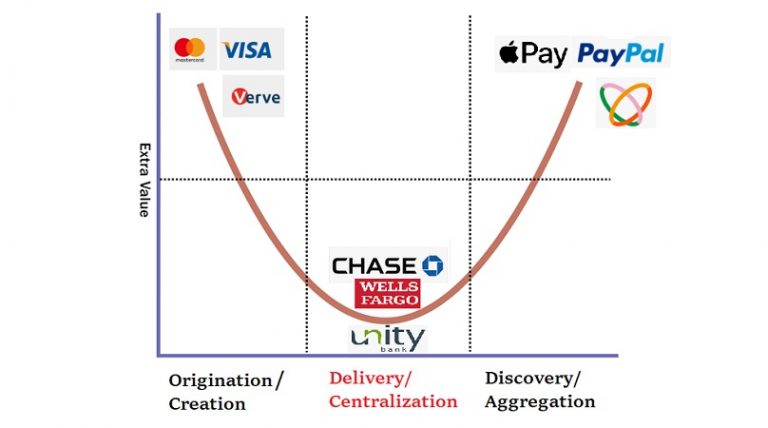
In this update by LinkedIn News, we are learning that US big banks are working together to create a product which could compete with PayPal and Apple Pay: ” Those firms are worried that third-party wallet operators such as Apple could dominate customer experience, leaving banks to run the financial architecture behind the scenes.” Indeed, the banks can build and sustain the infrastructure which makes banking and broad financial services possible while PayPal and Apple Pay just clean up on the value created.
The nation’s big banks are working together on a digital wallet that can be used to shop online — and which would compete head-on with Apple Pay and PayPal, reports The Wall Street Journal. The wallet will be linked to shoppers’ debit and credit cards and will be operated by Early Warning Services (EWS), a joint venture owned by JPMorgan Chase, Bank of America, Wells Fargo and several other banks. Those firms are worried that third-party wallet operators such as Apple could dominate customer experience, leaving banks to run the financial architecture behind the scenes. EWS, which also manages Zelle, plans to launch the wallet in the second half of the year. A PYMTS study in December found that in-store use of Apple Pay grew 56% year-over-year, while online use climbed by 63%.
As things stand today, that is actually what happens. When you receive $100 in your US bank account, the bank does not take any fee. But when you receive the same in your PayPal wallet, as payment, you will be off by at last $3. While someone can argue that the money kept in the bank can be used by the bank to do lending, we can also posit that the funds in the PayPal wallet can also be deployed by PayPal into many other profit-making activities. My point is clear: the banks do not capture a lot of value while PayPal and others like it do.
You can explain what is happening in a curve: the smiling curve. The companies which are at the center capture least value, and most times, there are the ones which support the ecosystem the most. But those at the edges capture the most value even though they do not provide a lot of catalytic support in the ecosystem.
Register for Tekedia Mini-MBA edition 18 (Sep 15 – Dec 6, 2025) today for early bird discounts. Do annual for access to Blucera.com.
Tekedia AI in Business Masterclass opens registrations.
Join Tekedia Capital Syndicate and co-invest in great global startups.
Register for Tekedia AI Lab: From Technical Design to Deployment.
PayPal and Apple Pay operate at the edges and extract tons of value while the US banks remain lost in the center capturing just a small value.
This video explains the phenomenon. Indeed, where you operate on that curve determines the value you can create and capture, well more than the efforts you are putting in. You can be working really hard as a bank by handling the delivery and centralization of customer assets while those firms at the origination/creation and discovery/aggregation positions smile.
Of course there are many value challenges for banks in general:
Fed up with big banks’ meager interest rates on checking and savings accounts, many wealthy Americans are pulling out their cash and investing in higher paying products. While the Federal Reserve has been hiking rates for nearly a year, the typical savings account only pays a 0.33% interest rate, The Wall Street Journal reports. But Treasury notes, money-market funds and brokered certificates of deposit pay between 4% to 5%. Affluent customers are taking advantage of those higher rates, causing a flight of deposits from banks’ wealth management businesses. Deposits at the Bank of America’s wealth unit sank 17% last year to $324 billion. Deposits in the consumer unit, meanwhile, fell only 0.6% to $1 trillion.
---
Connect via my
LinkedIn |
Facebook |
X |
TikTok |
Instagram |
YouTube



If the big banks create their own product, will they stop allowing money transfers via traditional method? If no, what difference will the new product make?
It is not about competing, but being profitable, else you will waste all the money and still lose spectacularly.